- Home
- Howard Jacobson
Pussy Page 11
Pussy Read online
Page 11
Dr Cobalt turned pale. ‘I will think about it further,’ she said. Later that day she arranged for Nietzsche’s Thus Spoke Zarathustra and Thomas Carlyle’s On Heroes, Hero-Worship and the Heroic in History to be delivered to the Prince electronically and waited for what he would have to say to her about them.
In the meantime she wondered if she’d gone too far and would be recalled to Urbs-Ludus. She told Kolskeggur what she’d done.
‘You brought up the matter of Spravchik’s violations of human rights with the Prince?’
She screwed her eyes up. ‘Have I been a fool?’
‘What did Fracassus think?’
‘Fracassus doesn’t think. He looked ill-pleased.’
‘By you, or by Spravchik’s violations?’
‘I very much doubt the latter. He has grown up in a jungle of human rights violations.’
‘Tut, tut.’
‘Are you tutting me or the Grand Duke?’
He kissed her forehead. A fatherly kiss. ‘I’ll tell you what I think,’ he said. ‘Whenever I heard people talking about human rights in my university I wanted to reach for my shotgun.’
‘Kolskeggur!’
‘That wasn’t because I wanted anything less for the despised and underprivileged than they did. I just described my outrage differently.’
‘Thereby making it about yourself.’
‘No, the very opposite.’
‘Are you saying I was making Spravchik’s crimes about me?’
‘That depends on what exactly you said and how you said it. But if you flew the flag of your emotions and showed your pain, then yes.’
‘Human rights are a flag to you?’
‘They will be to Fracassus. The very phrase affects members of his class the way a spade affects a garden worm. They might not be able to describe the weapon but they know they’re under attack from it.’
‘Silence is a recipe for defeatism.’
‘Whatever war you’re fighting you already aren’t winning. Listen to what’s in the wind. May I speak my mind?’
‘Well, it would appear I have spoken mine.’
Professor Probrius took a breath. Never a good sign if you were the interlocutor. ‘Every time you champion a special interest group you alienate those who fall outside it. That does make them illiberal. I don’t say be silent but I do say clean up your language. Change your precious cast of victims. Don’t make an enemy of anyone who doesn’t feel the hurt you do. Or just don’t give a damn.’
Dr Cobalt didn’t know why she suddenly felt peeved, but she did.
‘Do you know what?’ she said. ‘Why don’t you talk to the little prick your way and I’ll talk to him mine?’
Professor Probrius put up a hand of peace. Her way would work out perfectly nicely for him. She might as well have been loading Fracassus up with sticks of dynamite. He didn’t want any harm to come to her. He hoped that if he listened to the wind he would know when the explosion was coming and would be able to whisk her away from it. But that didn’t mean he wasn’t looking forward to the bang.
Fracassus said nothing further to Dr Cobalt that day. She couldn’t tell what mood he was in with her. But he did leave his PlayWatch lying about – perhaps deliberately – and she noticed what he was reading on it. Bear Grylls’ The Spirit of the Jungle, abridged.
CHAPTER 19
The spirit of the jungle
The party remained in the country of the Numa for several months, though there was no further trip to the mountains. Fracassus continued to receive tickets for Spravchik’s television show and attended it religiously. On one evening the warm-up man’s role was taken by Spravchik himself. ‘Tonight you’ll have to put up with me in all capacities,’ he told the crowd who shouted and called his name. He must have been aware of Fracassus’s presence because he translated some of his funny stories into a form Fracassus could understand.
Between anecdotes he talked about the deviancy that was eating the heart out of his country the way mice gnaw at a harvest. Homosexuality, he said, was against the will of God, whichever god you believed in. The Numa people, for example, before whose ancient wisdom he stood in awe, would throw any child showing homoerotic inclinations off the mountain. They could detect these inclinations in the first six months of the child’s life. And the moment they did – he made a motion suggestive of spading dirt into an empty grave – it was over the side with them. There was no hatred in this; it was all kindness. They couldn’t bear the thought of homosexual children going through life scarred by their unnaturalness.
‘Spravchik!’ the studio audience cried.
He had one more thing to say. For himself, he would rather have cancer than a lesbian for a daughter.
Spravchik! Spravchik!
Did he fling a smile – suggestive of spading dirt into an empty grave – at Fracassus?
Fracassus knew what he would tell Dr Cobalt should the subject of Spravchik’s violations of human rights crop up again. He would tell her that Spravchik was motivated by kindness not cruelty. He would tell her the Minister was joking. And he would tell her to remember her place.
Some of the tweets Fracassus composed in the time he was Spravchik’s guest throw light on his feelings for the man:
4 May: Great meeting with Vozzek Spravchik, television host extraordinary and Culture Secretary of this great country.
6 May: Journey to mountains with Vozzek. Great view. The Numa present me with bead necklace. Lovely people.
6 May: Vozzek says country can’t afford to go on looking after Numa people who drink too much. Sad.
9 May: Wrestle with Vozzek Spravchik, Minister of Home Affairs and Whistle-Blower host. I let him win.
11 May: Rematch. I let him win again.
20 May: Go swimming with Vozzek. Someone pulls my shorts off under water. Great guy.
20 May: Person who pulls my shorts off not Vozzek but I think his assistant from Whistle-Blower.
29 May: I’m learning so much here. Could stay forever.
7 June: Appalled to hear of violent demonstrations in my country. What do these people want …
7 June: … they have everything.
8 June: Vozzek offers to send army to restore order. Classy guy.
17 June: Vozzek Spravchik’s daughter announces she is lesbian. So sad.
Eager to mobilise his forces though Foreign Secretary and Defence Minister Spravchik was, he didn’t again invite Fracassus to pick somewhere on the map for them to invade. Fracassus was disappointed. Had it all been just another tease? Nor did Spravchik send help to Urbs-Ludus where the troubles had apparently subsided as quickly as they’d begun. But he did say his country was constantly monitoring the situation and that Fracassus could rest assured that his parents were safe and calm. Fracassus thanked him for the reassurance but wondered how he came by his information. ‘By hacking into your father’s computer system,’ Spravchik laughed.
Joking aside – supposing he were joking – something seemed to be troubling the Minister. He could not see Fracassus without embracing him and then withdrawing from his company with a sigh.
Not counting Sojjourner – and Fracassus was no longer counting Sojjourner – Fracassus had never been in love. So he didn’t know the signs. When Nero was in love he showed his feelings by raping the girl’s mother. But that didn’t help Fracassus in his current predicament. Was Spravchik in love with him or not?
Finally, on a horse ride into the Makindo Desert – Fracassus sitting behind the bare-chested Spravchik and clasping him tentatively round the waist – the Minister unburdened himself of what had been on his mind. He wanted a casino. Something memorable and monumental. And he wanted Fracassus to design it.
Was that all? Fracassus was disappointed. He’d hoped … but what had he hoped?
Of course he said yes.
Delighted, Spravchik proposed they toe-wrestled. Cholm was the world capital of toe-wrestling and an invitation to toe-wrestle the Culture Secretary was the highest honour the country cou
ld bestow.
Spravchik rode them to a natural amphitheatre, where fallen logs served for seats and two rocks, the distance of two men apart, were positioned like pillows. Spravchik told Fracassus to strip down to his Unterhosen. Fracassus was embarrassed: his legs were fine but he rightly feared his pecs were flabby. Spravchik explained the rules. They would stretch their lengths upon the stony ground, lie right foot to right foot, then left foot to left foot, pillow their heads upon the rocks, interlock big toes, and attempt to force the other’s foot into the flaming torches which Spravchik would now light. Best of seventeen throws. And damned be him that first cries ‘Hold!’ There would be no witnesses – Spravchik had a servant shave his chest, and then dismissed him.
They shook hands, then took up their positions. Fracassus looked up into the sky. Above him eagles soared. The sun beat down. ‘Spravchik!’ Spravchik shouted, and so it began. Their feet locked, their big toes, equally matched despite the difference in their years, clamped like spanners or the claws of eagles. Fracassus felt the strain of effort through his thighs and back. Spravchik hummed quietly to himself. The advantage went this way and that. Doubtful it stood, as two spent swimmers that do cling together.
The light began to dim.
And all day long the noise of battle rolled …
The following day, back in the Ministry, the two men, limping slightly, talked zoning and location.
‘Build it wherever you like,’ Spravchik said.
That was when Fracassus had his brainwave. ‘Let’s build it in the Blackbread Mountains,’ he said.
Spravchik leapt from his chair and embraced him. Then he stepped back and tapped his lip.
Was he wondering what to do about the Numa, Fracassus enquired. If so, he had the perfect solution. They could work in the kitchens and thread beads in the foyer.
Spravchik embraced him again. ‘Nice thought,’ he said. ‘But we must respect their ancient culture.’
Fracassus nodded. ‘How do we do that?’
‘We resettle them in some slum!’
Fracassus was relieved. He’d hoped Spravchik would see it that way.
He stayed on a year to see the project through its developmental stage. He tweeted links to artists’ impressions of the building. Classy partnership: classy building. News of its construction travelled far and wide. The Pleasure Temple of Numa, the pillars of its sacrificial temple stretching high into the clouds.
Yoni Cobalt, in Kolskeggur Probrius’s arms, wondered how long it would be before they’d be throwing babies who showed gay tendencies off its ramparts.
‘Shh,’ Kolskeggur Probrius said.
CHAPTER 20
Fracassus discovers the price of freedom and tweets about it
The party left Cholm by train. Fracassus was sad to leave. He felt that a part of himself would always remain here. He and Spravchik had embraced in private on the morning of departure. Fracassus liked to think that between men of surpassing power there existed a sort of electric force field and that when they embraced, especially for the final time, sparks like those emitted by the First Creation would fly between them. No such sparks flew between Spravchik and Fracassus, but it was a melancholy farewell notwithstanding.
Though the journey was reputed to be beautiful, Fracassus didn’t notice the meadows or the streams. There was good coverage on the train and he didn’t want to miss it. He was pleased to find his name wherever he looked and to see himself widely talked about. ‘What’s a wunderkind?’ he asked Professor Probrius.
‘A wonder child. Why?’
‘That’s what they’re calling me.’
‘That’s what you are, Your Highness.’
Less satisfying was the news from Urbs-Ludus. More disturbances were reported. Every day another demonstration against something. Every demonstration lasting longer than the one before. He sent an email to his father in the language of Twitter which was now the only language he could think in. He hoped it would convey the seriousness of his concern. Minister Spravchik sad to see me go. Everyone is. Even a wunderkind has to stay focussed.
Probrius hadn’t arranged for a car to meet them this time. He didn’t want another Spravchik situation. Better to get their passports stamped and slip in otherwise unobserved. A little more fuss was made of Fracassus on account of his title than Probrius thought necessary, but sycophancy always put the boy in better temper. ‘Welcome to Plasentza, Prince Fracassus.’ When a stranger called him Prince it was as though he had never heard the word before and became a stranger to himself. He would stand around, waiting to collect every rag of accolade, before he could be persuaded to move on. The luggage was being sent on ahead so they could walk through the city. Fracassus rarely walked and had certainly never walked anywhere like this.
‘What have your brought me to?’ he asked as they left the station. He had noticed people sleeping on the floor. He guessed this was because their trains were late. But then he saw people sleeping in shop doorways as well.
‘It’s called an advanced liberal democracy,’ Probrius explained.
‘What does that mean?’
‘It means there’s no monarchy, no presidency and no dictatorship.’
‘So who runs the place?’
‘Elected members of parliament.’
‘Who elects them?’
‘The people.’
‘Who elects the people?’
‘No one elects the people. They’re the people. They just are.’
Fracassus scratched his face.
‘This,’ Professor Probrius went on, ‘is considered to be the fairest form of government mankind has yet devised.’
Fracassus pointed to a couple of beggars sleeping top to tail in a cardboard box in the doorway of a coffee shop. He asked if they were toe-wrestling. Professor Probrius said he didn’t think so.
‘Then why are they here?’
‘Because there’s nowhere else for them to sleep.’
‘But aren’t they the people?’
‘You are indeed a wunderkind, Your Highness,’ Professor Probrius said. ‘You put your finger at once on the contradiction at the heart of government by the people. It doesn’t work because people aren’t nice to one another.’
‘Just a minute …’ Dr Cobalt began, but Professor Probrius stared her into silence.
‘How,’ Fracassus wondered, ‘do you unelect the people?’
Dr Cobalt was again frozen into silent compliance by Probrius’s stare.
‘It’s been tried, Your Highness. Your father has been wrongly accused of doing that very thing. A better way, in my view – and, if I may say so, in the view of many experts – is to give the people what they want in the full knowledge that they don’t know and then let them give the power back to you.’
Dr Cobalt could contain herself no longer. ‘Whereupon it will cease to be a liberal democracy,’ she said.
‘And whose fault will that be?’ Professor Probrius asked.
Fracassus had the answer. ‘The people’s.’
‘It’s never a good idea,’ Professor Probrius said, feeling he was coaching the Prince already, ‘to tell the people you are saving them from themselves. Better to tell them you’re saving them from someone else.’
‘Like who?’ Fracassus wondered.
‘Like anyone you can come up with.’
Dr Cobalt’s look met Professor Probrius’s. Like your father, they were both thinking.
Fracassus had an identical thought.
The following morning a bomb went off not many streets from their hotel. Six people were killed. Dozens injured. Fracassus watched the news on the hotel television. He could smell sweet gunpowder. And something worse.
It was by no means the first time such a crime had been committed and innocent bystanders killed or wounded. ‘This is the price we pay for our freedoms,’ a senior politician was saying. He had been accused before of taking a sort of satisfaction in it, as though a healthy liberal democracy needed the occasional atrocity to justify itself. Bu
t in one form or another almost all the politicians interviewed in the immediate aftermath of the bombing said the same. It was the price – the terrible price – the country paid for its freedoms.
Did Fracassus think it was too high a price? All one can say for sure is that he tweeted Terrible price to pay for freedom.
Because of the outrage, the Prince and his party weren’t allowed to leave the hotel that day. All three sat and watched the television in the hotel lobby in silence. Two hours after the bomb went off a terrorist group claimed responsibility. An hour after that the leader of a civil rights organisation warned against scapegoating the immigrant group whose ethnicity the terrorists shared. Already, Probrius nudged Fracassus into noticing, more concern had been expressed for the safety of the immigrant group than for the lives that had been lost. Makes you wonder who the victims are, Fracassus tweeted.
Dr Cobalt knew what Professor Probrius was doing and what Fracassus, under his tutelage, was struggling to give birth to as a thought. She seized a moment while Probrius was paying a visit to the lavatory to nudge Fracassus in another direction. ‘This could have happened anywhere, you know.’
‘Never has at home.’
‘That doesn’t mean it never will.’
‘Couldn’t happen in Cholm. Spravchik wouldn’t let it.’
‘You can’t be sure of that.’
Probrius was back sooner than she’d calculated. It was possible he’d changed his mind, realising what she was shaping up to say to Fracassus.
The three exchanged suspicious glances in silence until Professor Probrius asked her how she would define a phobia.
‘You know what a phobia is.’
‘I want to hear it from your lips.’
‘A phobia is an irrational fear.’
‘What’s irrational about a fear of being bombed?’
‘Nothing. It’s perfectly rational, unless it paralyses you from living your life.’
‘Then what’s irrational about being afraid of the people doing it?’
‘Nothing. What’s irrational is blaming everybody who looks like them.’

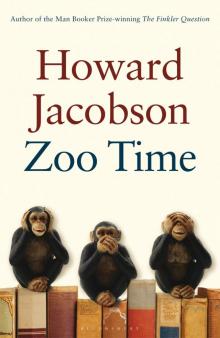 Zoo Time
Zoo Time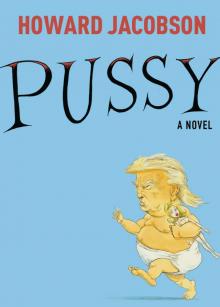 Pussy
Pussy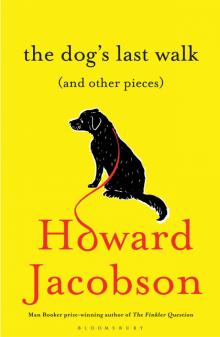 The Dog's Last Walk
The Dog's Last Walk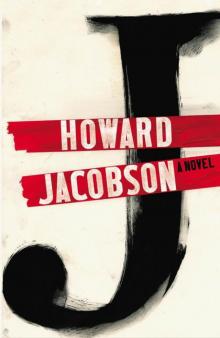 J
J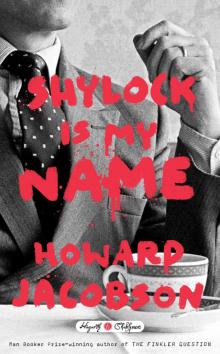 Shylock Is My Name
Shylock Is My Name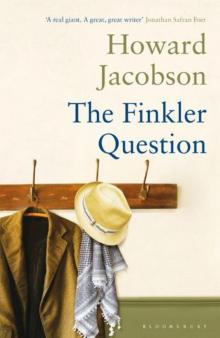 The Finkler Question
The Finkler Question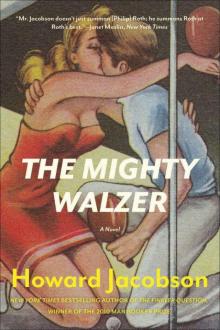 The Mighty Walzer
The Mighty Walzer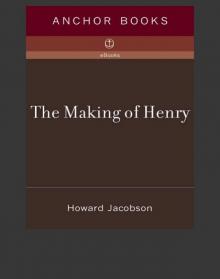 The Making of Henry
The Making of Henry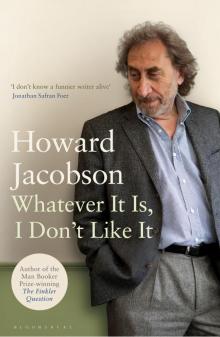 Whatever it is, I Don't Like it
Whatever it is, I Don't Like it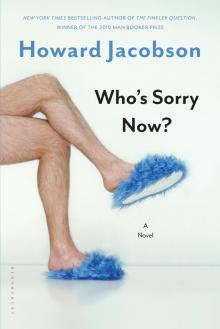 Who's Sorry Now?
Who's Sorry Now? Kalooki Nights
Kalooki Nights